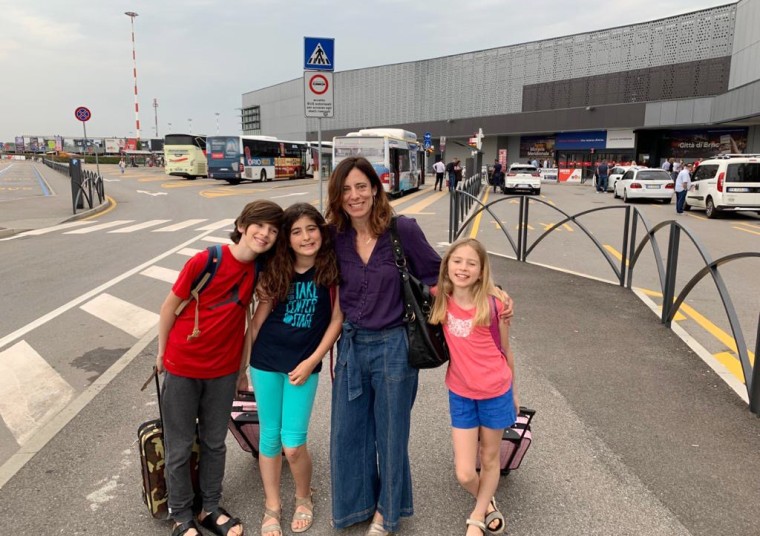For nearly two weeks, Cristina Higgins, an American who lives in Italy, has traveled no farther from her apartment building than the driveway. Her days begin at the breakfast table with her husband and three children before the kids log online to do their schoolwork from home. The family spends their evenings playing Monopoly in their apartment.
Throughout the day, Higgins looks at the news for updates on the growing number of coronavirus cases in the country and checks in on friends. Each night, overwhelmed with anxiety over the spread of the virus, she finds it hard to sleep.
"We have friends who are getting sick. It's very stressful," Higgins told NBC News over the phone from her home in Bergamo, where she, like everyone else, is under government-ordered home isolation, even though she and her family are not sick. "I am nauseous all day long, because every time I look at the news or talk to somebody else, something terrible has happened. And I don't know what's going to happen next."
Full coverage of the coronavirus outbreak
With more than 12,000 confirmed cases and more than 800 deaths, Italy has become the European epicenter of the coronavirus outbreak, with the number of sick overwhelming hospitals. On Tuesday, Higgins posted a description of life "at the heart of the coronavirus crisis" on Facebook — an attempt to get Americans and people in other countries to heed warnings and take precautions to avoid spreading the virus. The post had been shared more than 100,000 times as of Wednesday afternoon.
"Each of you, today, not the government, not the school district, not the mayor, each individual citizen has the chance, today to take actions that will deter the Italian situation from becoming your own country’s reality," she wrote. "The only way to limit contagion is for millions of people to change their behavior today."
Higgins said she rarely posts to Facebook but felt it was important to convey to those outside of Italy who can't comprehend how bad the situation is that they need to do whatever they can to not pass on the disease.
"The only way to stop this virus is to limit contagion."
"I'm trying to get through the disbelief phase faster," she said. "The only way to stop this virus is to limit contagion."
Italy has taken drastic measures in recent days to try to contain transmission, including putting all 60 million residents on a nationwide lockdown for at least a month.
The government has banned travel and closed schools and other large gathering places. At the few places that remain open — primarily grocery stores and pharmacies — people must stand at least 3 feet apart to minimize the chance of COVID-19, the illness the coronavirus causes.
Higgins has food and other supplies in her apartment, but her husband makes occasional outings to the supermarket to restock. The usually bustling market only allows a set number of people in at a time so they don't violate the 3-foot rule. When her husband went earlier this week, there were "individuals walking around with face masks looking at each other very suspicious, very scared," Higgins said.
"It's surreal. It's dystopian," she said.
Download the NBC News app for full coverage of the coronavirus outbreak
In the United States as of Wednesday afternoon, more than 1,000 cases of the coronavirus had been diagnosed. The Centers for Disease Control and Prevention has recommended commonsense practices such as proper hand-washing to prevent it from spreading, plus other tactics, such as social distancing, which includes canceling events that will attract a large number of people.
In her Facebook post, Higgins underscored the importance of this based on her first-hand experience.
"You have a chance to make a difference and stop the spread in your country. Push for the entire office to work at home today, cancel birthday parties, and other gatherings, stay home as much as you can. If you have a fever, any fever, stay home. Push for school closures, now. Anything you can do to stop the spread, because it is spreading in your communities — there is a two week incubation period — and if you do these things now you can buy your medical system time," she wrote.
Higgins said she was impressed by how quickly the Italian government implemented restrictions once it was clear how rapidly cases were growing there. Her children's schools, and a university in Milan where she teaches a course on leadership across cultures, have been closed since Feb. 24 by government mandate, and no one knows for sure when they will reopen.
For Higgins' children, who are 12, 10 and 9, being at home in the apartment has not been bad. Their schools have been sending homework for them to do every day, Higgins said, and the kids are having fun studying with their friends via videoconference.
But for Higgins, the reasons behind the home isolation have been difficult to deal with. She ventures out of her apartment only to go to the garden adjacent to her building and to walk laps in the driveway; her kids and her brief walks have been a good distraction, she said.
"It's not a time to panic. It's time to be a responsible citizen."
The attention her Facebook post has gotten has surprised Higgins. She said she is glad it is raising awareness, but urged Americans not to panic.
"Try to put into place preventative measures now, because that will make a huge difference," she said.
"What the government says to us, which I think is fantastic, is it's not a time to panic. It's time to be a responsible citizen," she added. "If everybody does their part, it will be fine."
Follow NBC HEALTH on Twitter & Facebook.



